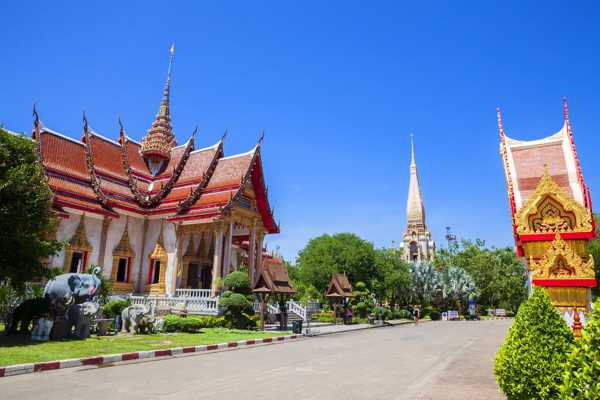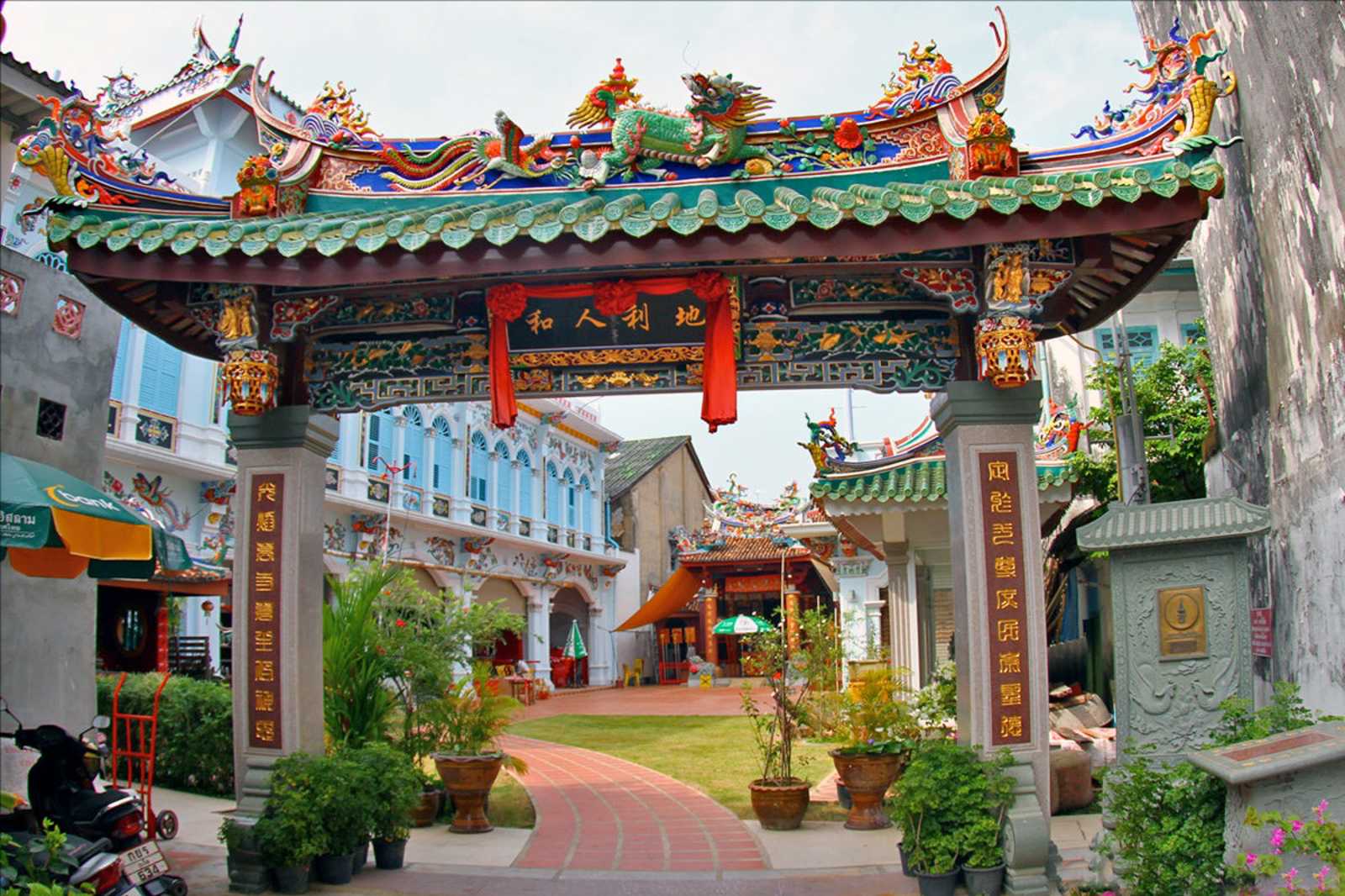Phuket has a large population of Chinese residents, who descended from immigrants from southern China a few centuries ago to work in the tin mining business. Their rich culture and traditions are evident in quaint Chinese temples and shrines around the island, as well as the annual Vegetarian Festival.
Their religion is predominantly a mixture of Buddhism, Chinese and Taoism. Red and yellow are considered lucky colours, while animals like dragons, lions and monkeys are important symbols. Phuket's Chinese shrines and temples are must-visits if you want to experience the local culture.
- 1
Bang Neow Shrine

- Budget
- Fotografering
Bang Neow Shrine, founded in 1904, is a beautiful place of worship in Phuket Town. Also called the Theprasi Foundation Shrine, it was originally part of another shrine at Soi Romanee before permanently moving to Phuket Road. The shrine has an elegant interior design with many printings on the walls recounting stories from Chinese literature. Carvings of the dragon, an important Chinese legendary creature, are prominently featured on the shrine’s supporting columns.
Adress: Phuket Road, Baan Bang Neow, Talad Yai, Muang, Phuket 83000, Thailand
Öppettider: Daily from 8.30am to 10pm
Karta - 2
Boon Kaw Kong Shrine

- Budget
- Historia
- Fotografering
Most drivers honk their horns to show respect to Boon Kaw Kong Shrine, located on top of Patong Hill. Founded in 1980, this small but well-respected Chinese shrine is decorated with paper lanterns and sculptures of dragons, monkeys and lions. When devotees' wishes are granted they usually come back to Boon Kaw Kong Shrine and give thanks by lighting firecrackers. Photography is not allowed inside the shrine.
Adress: Patong, Kathu, Phuket 83150, Thailand
Öppettider: Daily from 9am to 5pm
Karta - 3
Hok Nguan Kung Shrine

- Budget
- Historia
- Fotografering
Hok Nguan Kung Shrine has long been a religious centre of many local families since it was founded over 80 years ago. It's located on Phuket Road, at the Surin Clock Circle in Phuket Town. One of the shrine's most important ritual objects is the crafted image of Ju Su Kong. Made from sandalwood, his statue is completely black from head to toe.
Adress: Phuket Road, Muang, Phuket 83000, Thailand
Öppettider: Daily from 8am to 6pm
Karta - Budget
- Historia
- Fotografering
Visa merJui Tui Shrine is a popular Chinese temple that plays a pivotal part in the annual Phuket Vegetarian Festival. The main building has 3 large altars displaying statues of Chinese gods.
It’s the place where locals can come to celebrate special occasions (birthdays, weddings, newborn babies and healing) and share their sorrows and hard times. One of the island's oldest and the most respected spiritual centres, Jui Tui Shrine is a must-see for newcomers to Phuket.
Adress: 283 Soi Phutorn, Talat Nuea, Muang, Phuket 83000, Thailand
Öppettider: Daily from 8am to 8.30pm
Telefonnummer: +66 (0)76 213 243
Karta- 5
Kathu Shrine

- Budget
- Historia
- Fotografering
Kathu Shrine shares a long history with Phuket’s Vegetarian Festival – it's believed to be where the festival originated from. It's a rather small and peaceful temple, where you can see historical items such as wooden crafted Taoist deities and vintage implements used for body-piercing during the Vegetarian Festival. The main altar displays a statue of Guan Yin (the Goddess of Mercy), along with wooden Buddha images.
Adress: 4020 Kathu, Phuket 83120, Thailand
Öppettider: Daily from 6am to 6pm
Karta - 6
Kio Thian Keng Saphan Hin Shrine

- Budget
- Historia
- Fotografering
Kio Thian Keng Saphan Hin Shrine has artistic images of various deities on its altars and few life-size statues throughout its premise. Located at Saphan Hin Park, it's the only Phuket shrine close to the seashore. Kio Thian Keng Saphan Hin Shrine is the departure spot to send all gods/deities back to heaven on the final night of the Vegetarian Festival. You can see colourful parades of each shrine officially come to an end in Phuket.
Adress: Soi Bang Yai, Wichit, Muang, Phuket 83000, Thailand
Öppettider: Daily from 6am to 6pm
Karta - 7
Put Cho Shrine

- Budget
- Historia
- Fotografering
Put Cho Shrine is one of the oldest Chinese Taoist temples on Phuket. It's built to honour Guan Yin, the Chinese Goddess of Mercy. Locals often come here to seek help when they have health issues. They shake a box full of bamboo sticks until 1 falls out. They use the number written on the stick to get a medication prescription from the temple. Many parents with Chinese heritage come to Put Cho Shrine to get names for their newborn babies. It's believed that children with a proper name will enjoy a good and long life.
Adress: 289 Soi Phutorn, Talat Nuea, Muang, Phuket 83000, Thailand
Öppettider: Daily from 6.30am to 8pm
Karta - 8
Lim Hu Tai Su Shrine

- Budget
- Historia
- Fotografering
Lim Hu Tai Su Shrine (Samkong Shrine) is a small shrine located 3.5 km north of the Phuket Town Central Market. It plays a major part in the Samkong villagers’ lives, especially when someone falls ill or needed some advice to improve their health.
Locals often bring traditional medicine from local shops and pray for the shrine's deity for blessings. Visiting Samkong Shrine is free, but donations are appreciated to help support its renovations and charities.
Adress: 2 Yaowarat 1 Road, Rassada, Muang, Phuket 83000, Thailand
Öppettider: Daily from 6am to 6pm
Karta - Budget
- Historia
- Fotografering
Visa merThe Shrine of the Serene Light was established in the late 19th century by the descendants of the Tan Luan Jae family. It's modest in size but clearly shows its Hokkien Chinese heritage with its terracotta-tiled roof and single-storey construction. Note that photography isn't allowed inside the main part of the temple. The Shrine of the Serene Light is just a few minutes west of many Phuket Town landmarks, including The Memory at On On Hotel and Thavorn Hotel Museum.
Adress: 72/1 Yaowarat Rd, Talat Yai, Muang, Phuket 83000, Thailand
Karta- 10
Sui Boon Tong Shrine

- Budget
- Historia
- Fotografering
Sui Boon Tong Shrine occupies a yellow shop-house in Phuket Town, around 850 metres southwest of Phuket Town Central Market. Also called Lorong Shrine, it was one of the most important shrines during the annual Vegetarian Festival.
During your visit, you might see locals rubbing the big belly of a Budai image sitting on the shrine's terrace. He's a Chinese deity with a kind and smiling face. Devotees believe that by rubbing his big belly, it'll bring them wealth and prosperity.
Adress: Pattana Soi 8, Talat Nuea, Phuket Town, Muang, Phuket 83000, Thailand
Öppettider: Daily from 6am to 6pm
Karta - 11
Tha Rua Shrine

- Budget
- Historia
- Fotografering
Tha Rua Shrine is the 4th-oldest Taoist temple in Phuket. It's located close to the Heroines Monument on Thepkasattri Road. The temple is painted in bright gold, red and green, with many striking sculpted dragons and traditional Chinese paintings throughout.
The centre of Tha Rua Shrine's front terrace has a huge brass container, which was brought to Phuket from China. Inside the prayer hall, you’ll find several statues of Guan Yin (the Goddess of Mercy) and prominent Taoist deities.
Adress: 187/7 Soi Lak Mueang 1, Si Sunthon, Thalang, Phuket 83110, Thailand
Öppettider: Daily from 6am to 6pm
Karta - 12
Wat Choeng Thale
- Budget
- Historia
- Fotografering
Wat Choeng Thale was founded in 1901 by Mr Ju Pai Tuk, a hairdresser who brought back 3 wooden images of Taoist deities from China to set up the shrine. It's usually quiet most of the year, only becoming lively during prominent events such as Chinese New Year, deity ceremony days and during Phuket's Vegetarian Festival.
The main altar houses a statue of Nacha (Nezha), an important deity which is believed to be Heaven's sole gateman. He's often depicted as an adult male figure carrying a big golden ring and lance as weapons.
Adress: 2 Soi Cherngtalay 6, Cherngtalay, Thalang, Phuket 83110, Thailand
Öppettider: Daily from 6am to 8pm
Karta - 13
Chao Mae Kuan Im Shrine
- Budget
- Historia
- Fotografering
Chao Mae Kuan Im Phra Phothisat Shrine is a small vintage shrine on Bangkok Road in Phuket Town. It's devoted to Guan Yin, the Goddess of Mercy in Taoist mythology. Locals believe that she grants fertility, so it's common to see sculptures of babies and little children by her side. The inner hall's ceiling is decorated with wind chimes, paper lanterns, and hanging spiral joss sticks.
Adress: 5166 Soi Im Chit 1, Talat Nuea, Muang, Phuket 83000, Thailand
Öppettider: Daily from 8am to 8pm
Karta - 14
Kuan Tae Kun Shrine
- Budget
- Historia
- Fotografering
Kuan Tae Kun Shrine (Sapam Shrine) is a compact little shrine in Sapam Village, located around 7 km north of Phuket Town. It serves the Chinese migrant community from Fujian, who settled in this part of the island over 200 years ago.
The temple is dedicated to Guan Yu, a general in the Eastern Han Dynasty who's often mentioned in the famous Chinese historical novel Romance of the Three Kingdoms. He is known as a symbol of righteousness and loyalty.
Adress: 250 Soi Ruam Chai, Ko Kaeo, Muang, Phuket 83000, Thailand
Karta











